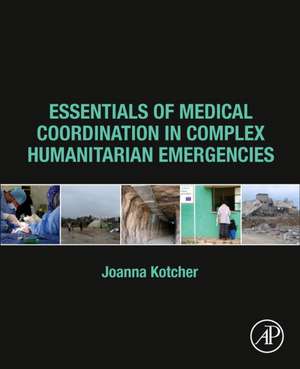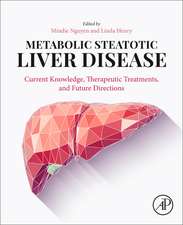Essentials of Medical Coordination in Complex Humanitarian Emergencies
Autor Joanna Kotcher Fulleren Limba Engleză Paperback – 31 oct 2024
- Details essential foundational knowledge as well as protocols, guidelines, and standard procedures for lead international agencies such as the World Health Organization (WHO), UNICEF, SPHERE, and the Inter-agency Working Group
- Written by author who has coordinated emergency response in conflict environments such as Kosovo, Central Asia (Tajikistan), Afghanistan, Darfur, Gaza and the OPT, Somaliland, Syria, and Iraq
- Elaborates on the actual tasks and skills related to field work in coordinating and implementing a response for complex humanitarian emergencies
Preț: 577.49 lei
Preț vechi: 634.60 lei
-9% Nou
Puncte Express: 866
Preț estimativ în valută:
110.53€ • 114.96$ • 92.63£
110.53€ • 114.96$ • 92.63£
Carte disponibilă
Livrare economică 14-28 februarie
Preluare comenzi: 021 569.72.76
Specificații
ISBN-13: 9780128189108
ISBN-10: 012818910X
Pagini: 400
Ilustrații: 75 illustrations (25 in full color)
Dimensiuni: 191 x 235 mm
Editura: ELSEVIER SCIENCE
ISBN-10: 012818910X
Pagini: 400
Ilustrații: 75 illustrations (25 in full color)
Dimensiuni: 191 x 235 mm
Editura: ELSEVIER SCIENCE
Public țintă
public health practitioners; health care professionals responsible for coordinating and managing humanitarian response; administrative individuals in the field during emergencies, conflicts, and natural disasters; international aid agencies; Public Health masters and doctoral students, medical professionals and health administrators contemplating disaster relief and Global Health careersCuprins
Part 1: Foundation
1. Elements of low resource and conflict environments
2. Humanitarian health systems: one sector within a coordinated response
3. Standards, protocols, guidelines
4. The role of the coordinator
5. Assessment and start-up
6. The project proposal: essential elements
7. Basic epidemiological measurements and tools
8. Team management and coordination
Part II: Implementation
9. Medical logistics
10. Primary health care
11. Sexual and reproductive health
12. Emergency medical care
13. Laboratory and safe blood transfusion
14. Surgical services
15. Trauma surgery in armed conflict
16. Expanded program on immunization (EPI)
17. Nutrition
18. Mental health and psychosocial support (MHPSS)
19. Management of non-infectious disease
20. Community health promotion
21. Health information systems and disease surveillance
22. Humanitarian medics and human rights
Appendices
1. Sample job descriptions for medical/health coordination
2. Indicators by health care sector
3. Commonly used epidemiological tools
4. Sample training outlines by sector
5. Universal precautions
6. Minimum standards for aseptic technique
1. Elements of low resource and conflict environments
2. Humanitarian health systems: one sector within a coordinated response
3. Standards, protocols, guidelines
4. The role of the coordinator
5. Assessment and start-up
6. The project proposal: essential elements
7. Basic epidemiological measurements and tools
8. Team management and coordination
Part II: Implementation
9. Medical logistics
10. Primary health care
11. Sexual and reproductive health
12. Emergency medical care
13. Laboratory and safe blood transfusion
14. Surgical services
15. Trauma surgery in armed conflict
16. Expanded program on immunization (EPI)
17. Nutrition
18. Mental health and psychosocial support (MHPSS)
19. Management of non-infectious disease
20. Community health promotion
21. Health information systems and disease surveillance
22. Humanitarian medics and human rights
Appendices
1. Sample job descriptions for medical/health coordination
2. Indicators by health care sector
3. Commonly used epidemiological tools
4. Sample training outlines by sector
5. Universal precautions
6. Minimum standards for aseptic technique
















